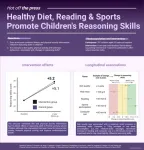(Press-News.org) The AI model was more efficient at detecting signatures of atrial septal defect (ASD) in electrocardiograms (ECG) than traditional methods.
Investigators from Brigham and Women’s Hospital, a founding member of the Mass General Brigham healthcare system, and Keio University in Japan have developed a deep learning artificial intelligence model to screen electrocardiogram (ECG) for signs of atrial septal defects (ASD). This condition can cause heart failure and is underreported due to a lack of symptoms before irreversible complications arise. Their results are published in eClinicalMedicine.
"If we can deploy our model on a population-level ECG screening, we would be able to pick up many more of these patients before they have irreversible damage," said Shinichi Goto, MD, PhD, corresponding author on the paper and instructor in the Division of Cardiovascular Medicine at Brigham and Women’s Hospital.
ASD is a common adult congenital heart disease. It is caused by a hole in the heart’s septum that lets blood flow between the left and right atriums. It’s diagnosed in about 0.1% to 0.2% of the population but is likely underreported, Goto said. The symptoms of ASD are typically very mild or, in many cases, nonexistent until later in life. Symptoms include an inability to do strenuous exercise, affect the rate or rhythm of the heartbeat, heart palpitations, and an increased risk of pneumonia.
Even if ASD isn’t causing symptoms, it can stress the heart and increase the risk of atrial fibrillation, stroke, heart failure, and pulmonary hypertension. At that point, the complications of ASD are irreversible, even if the defect is fixed later. If found early, ASD can be corrected with minimally invasive surgery to improve life expectancy and reduce complications.
There are several ways to detect ASD. First, the largest defects can be found by listening to the heart with a stethoscope. But only about 30% of patients can be discovered this way. Another is by echocardiogram, a time and labor-intensive test that is not a good option for screening. Another test, electrocardiography, or ECG, takes only about a minute, making it possible to use as a screening tool. However, when humans analyze an ECG readout for known abnormalities associated with ASD, there is limited sensitivity for picking up ASD.
To see if an AI model could better detect ASD from ECG readouts, the study team fed a deep learning model ECG data from 80,947 patients over 18 who underwent both ECG and echocardiogram to detect ASD. A total of 857 patients were diagnosed with ASD. The data was collected from three hospitals: two large teaching institutions — one, BWH, in the US and the other, Keio University in Japan, and Dokkyo Medical University, Saitama Medical Center in Japan, a community hospital. The model was then tested using scans from Dokkyo, which has a more general population and isn't specifically screening patients for ASD. The model was more sensitive than using known abnormalities found on ECGs to screen for ASD. The model correctly detected ASD 93.7% of the time, while using known abnormalities found ASD 80.6% of the time.
"It picked up much more than what an expert does using known abnormalities to identify cases of ASD," Goto said. One limitation of the study is that the model was trained used samples from academic institutions, which deal more with rare diseases like ASD. All the patients used to train the model were being screened for ASD and received an echocardiogram, so it is not clear how well the model would work on a general population, which is why they tested it in Dokkyo. "The model's performance was retained even in the community hospital's general population, which suggests that the model generalizes well."
The authors also note that even the use of echocardiogram to detect ASD will not find every defect. Some could slip through both the regular screening and the AI model, though these smaller defects are less likely to require surgical closure. “The problem of machine learning is that it's a black box — we don't really know what features it picked up,” Goto said. That means we can’t learn what features to look for in ECGs from the model, either.
Results suggest that the technology could be used in population-level screening to detect ASD before it leads to irreversible heart damage. ECG is relatively low cost and currently performed in many contexts. “Perhaps this screening could be integrated into an annual PCP appointment or used to screen ECGs taken for other reasons,” Goto said.
Disclosures: The study authors declare no competing interests.
Funding: Funding sources for this research include grants from the Vehicle Racing Commemorative Foundation, Japanese Science and Technology Agency (JPMJPF2101), JSR Life Sciences, Taiju Life Social Welfare Foundation, Kondou Kinen Medical Foundation, Research fund of Mitsukoshi health and welfare foundation, Tokai University School of Medicine Project Research and Internal Medicine Project Research, SECOM Science and Technology Foundation, and Japan Agency for Medical Research and Development (23hma922012h0001 and 23ym0126813j0002).
Paper cited: Miura K et al. " Deep Learning-Based Model Detects Atrial Septal Defects from Electrocardiography: A Cross-Sectional Multicenter Hospital-Based Study" eClinicalMedicine DOI: 10.1016/j.eclinm.2023.102141
END
AI model developed by Brigham researchers could help screen for heart defect
The AI model was more efficient at detecting signatures of atrial septal defect (ASD) in electrocardiograms (ECG) than traditional methods.
2023-08-17
ELSE PRESS RELEASES FROM THIS DATE:
Child Development Journal Q&A: How do youth view gang violence is shaping their communities?
2023-08-17
How do children and adolescents evaluate and reason about acts of physical violence in the context of chronic violence that impacts their communities? Previous studies have used situations that correspond with a single act of interpersonal harm void of broader conditions of violence shaping the context in question. A new study released in Child Development examined how youth exposed to gangs known as maras (e.g., MS 13) in Honduras morally deliberate about conditions of gang violence compared with youth not exposed to gangs in Nicaragua, where there are very few maras ...
Can children recognize sick faces?
2023-08-17
According to the World Health Organization, globally, infectious disease is a leading cause of death among children. Furthermore, children are more likely than adults to contract infectious illnesses. However, there’s a gap in research measuring children’s responses to sick faces. It is important to understand how children’s ability to recognize and avoid sickness emerges and develops to help improve children’s health and public health more broadly. Previous research has only reported that adults can use faces to recognize if someone is sick and make judgments about whether to approach or avoid them.
Researchers from the University ...
Lorazepam treatment may be linked to worse outcomes for pancreatic cancer patients
2023-08-17
PHILADELPHIA – Patients with pancreatic cancer who took the benzodiazepine lorazepam (Ativan), commonly prescribed to treat anxiety during cancer treatment, had a shorter progression-free survival than patients who did not, according to results published in Clinical Cancer Research, a journal of the American Association for Cancer Research (AACR).
In contrast, patients who took the benzodiazepine alprazolam (Xanax) had a significantly longer progression-free survival than patients who did not.
Benzodiazepines are a class of drugs that suppress the activity of the central nervous system, which can relieve ...
A healthy diet, reading, and doing sports promote reasoning skills in children
2023-08-17
Reasoning skills are crucial skills in learning, academic performance, and everyday problem-solving. According to a recent study conducted at the University of Eastern Finland, improved overall diet quality and reduced consumption of red meat, as well as increased time spent in reading and organised sports enhanced reasoning skills among children over the first two school years.
“Children with healthier eating habits showed greater cognitive development than other children. Specifically, better overall diet quality, ...
Heredity and environment account for people’s love of nature
2023-08-17
Humans have a positive view of nature. But is this due to an approach we have learned while growing up, or is it something we are born with? The answer is ‘Both’, according to researchers at the University of Gothenburg and the Swedish University of Agricultural Sciences.
Our love of nature is highly individual and should influence how we plan our cities, say the researchers.
It is well known that nature has a positive effect on people. In cities in particular, studies have shown that trees and other greenery contribute to people’s wellbeing. However, experts do not agree on the reasons behind this phenomenon, known ...
Are you breaking your body clock?
2023-08-17
Researchers are using mathematical models to better understand the effects of disruptions like daylight savings time, working night shifts, jet lag or even late-night phone scrolling on the body’s circadian rhythms.
The University of Waterloo and the University of Oxford researchers have developed a new model to help scientists better understand the resilience of the brain’s master clock: the cluster of neurons in the brain that coordinates the body’s other internal rhythms. They also hope to suggest ...
HKUMed & CityU researchers jointly generate human neural stem cells with powerful therapeutic potential for the treatment of spinal cord injury, paving the way for new therapeutic opportunities
2023-08-17
A joint research team from LKS Faculty of Medicine, the University of Hong Kong (HKUMed) and City University of Hong Kong (CityU) has generated human neural stem cells with powerful therapeutic potential for the treatment of spinal cord injury that paves the way for new therapeutic opportunities. The new findings are now published in the leading multidisciplinary science journal, Advanced Science [link to publication].
Background
Traumatic spinal cord injury (SCI) commonly caused by a car accident, fall, or sport-related accident results in the progressive loss of neurons involved in motor and sensory functions at and around ...
Nauseous territory: outfoxing predators using baits that make them barf
2023-08-17
Introduced foxes, dogs, cats, rats, and other predators kill millions of native animals every year, but what if they were conditioned to associate this prey with food that made them ill?
A team of international researchers have shown the potential to do just that, burying baits containing capsules of levamisole, a chemical that induces nausea and vomiting when consumed by predators.
In a world first experiment conducted in south-eastern Australia, where introduced red foxes are responsible for countless wildlife deaths, the Australian National University (ANU) and University of South Australia scientists laid baits of fried deboned chicken, with some containing ...
Accelerating discovery in artificial intelligence for science
2023-08-17
What if artificial intelligence (AI) could be used to spur discovery in areas such as biotechnology, drug discovery and fluid dynamics? Using geometric graphs and innovative methodologies, AI can solve fundamental problems in basic natural science. The possibilities are endless in this relatively new field known as AI for science.
Dr. Shuiwang Ji, a professor in the Department of Computer Science and Engineering at Texas A&M University, recently received a National Science Foundation grant to ...
Sylvester Surgeon-scientist awarded center’s first Department of Defense grant to study pancreatic cancer
2023-08-17
MIAMI, FLORIDA (Aug. 17, 2023) – Researchers with Sylvester Comprehensive Cancer Center at the University of Miami Miller School of Medicine have been awarded a grant from the U.S. Department of Defense (DoD)’s Congressionally Directed Medical Research Program to target chemotherapy resistance in pancreatic cancer.
The $800,000, three-year grant is the first DoD award to Sylvester to study pancreatic cancer, a disease characterized by extreme resistance to chemotherapy and other treatments and dismal survival rates.
Pancreatic ductal adenocarcinoma is the most common and aggressive ...
LAST 30 PRESS RELEASES:
Transient Pauli blocking for broadband ultrafast optical switching
Political polarization can spur CO2 emissions, stymie climate action
Researchers develop new strategy for improving inverted perovskite solar cells
Yes! The role of YAP and CTGF as potential therapeutic targets for preventing severe liver disease
Pancreatic cancer may begin hiding from the immune system earlier than we thought
Robotic wing inspired by nature delivers leap in underwater stability
A clinical reveals that aniridia causes a progressive loss of corneal sensitivity
Fossil amber reveals the secret lives of Cretaceous ants
Predicting extreme rainfall through novel spatial modeling
The Lancet: First-ever in-utero stem cell therapy for fetal spina bifida repair is safe, study finds
Nanoplastics can interact with Salmonella to affect food safety, study shows
Eric Moore, M.D., elected to Mayo Clinic Board of Trustees
NYU named “research powerhouse” in new analysis
New polymer materials may offer breakthrough solution for hard-to-remove PFAS in water
Biochar can either curb or boost greenhouse gas emissions depending on soil conditions, new study finds
Nanobiochar emerges as a next generation solution for cleaner water, healthier soils, and resilient ecosystems
Study finds more parents saying ‘No’ to vitamin K, putting babies’ brains at risk
Scientists develop new gut health measure that tracks disease
Rice gene discovery could cut fertiliser use while protecting yields
Jumping ‘DNA parasites’ linked to early stages of tumour formation
Ultra-sensitive CAR T cells provide potential strategy to treat solid tumors
Early Neanderthal-Human interbreeding was strongly sex biased
North American bird declines are widespread and accelerating in agricultural hotspots
Researchers recommend strategies for improved genetic privacy legislation
How birds achieve sweet success
More sensitive cell therapy may be a HIT against solid cancers
Scientists map how aging reshapes cells across the entire mammalian body
Hotspots of accelerated bird decline linked to agricultural activity
How ancient attraction shaped the human genome
NJIT faculty named Senior Members of the National Academy of Inventors
[Press-News.org] AI model developed by Brigham researchers could help screen for heart defectThe AI model was more efficient at detecting signatures of atrial septal defect (ASD) in electrocardiograms (ECG) than traditional methods.




